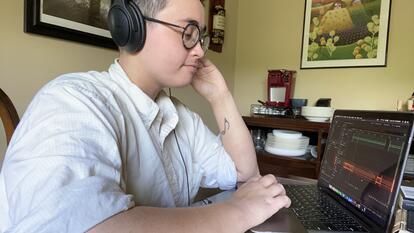In Search of Missing Girlhoods: A Wellesley Mother and Daughter Discuss Their Journey on WBUR

Melissa Ludtke ’73 wanted her daughter, Maya Ludtke ’19, whom she adopted from China, to get to know her roots, so the two traveled to China twice. The first time was a sightseeing trip when Maya was 7; the second, when she was 16, was a very different kind of visit. During that trip, Maya returned to the rural town where she’d been left as a baby, and she got to know girls her age who grew up there. They became her guides to what her life there might have been like.
Appearing recently on WBUR’s All Things Considered, Maya and Melissa discussed the events that led them to create six multimedia stories about Maya’s cross-cultural experiences. Melissa, a veteran journalist, and Maya have written for a number of media outlets (including Wellesley Magazine in December 2016) about Maya’s journey of discovery and Touching Home in China, the multimedia project that they developed for teachers and students from middle school to college. It features stories and lesson plans to stimulate exploration of identity, population control policies, and the influence of gender-based societal expectations on children and families.
Melissa told WBUR that throughout this experience she kept one thought in mind: “If Maya was abandoned because she was born a girl during that time, what might her life have been like as a daughter growing up in that same rural town in China (if she were not abandoned)”? As Melissa stated in an email, “My entire life’s work has revolved around women’s and girls’ lives and issues, so to be able to illuminate my daughter’s life and the lives of girls and women in China is a capstone to my career as a journalist and my life as an activist.”
During the interview, Maya said it could be tough growing up in America, such as when “dealing with people who don’t understand adoption or made fun of me for the way I looked, or didn’t understand how I could possibly be the daughter of my mom.” She also described on WBUR how it is to live with her dual identity given the vastly different cultures of China and the United States: “How much am I Chinese? How much am I American? And when do I lean one way or the other?”
Maya told WBUR that she hopes the curriculum she and her mom developed “will be valuable for people from a wide range of ethnic and cultural backgrounds.” As she told DS writers, “this makes my own journey more meaningful because I can share it with others.”
Photo: Melissa Ludtke ’73 holds her daughter, Maya Ludtke ’19, as a young child.



